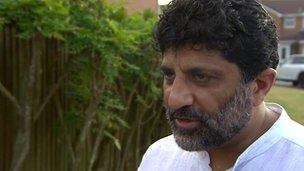Are anti-Muslim hate crimes rising?
- Published
- comments
What do we know about anti-Muslim hate crimes since the killing of Fusilier Lee Rigby?
This week, one of the UK's largest Islamic organisations has called for a tougher government response to a "dramatic escalation in violence" against British Muslims.
The call from the Muslim Council of Britain (MCB) comes amid fears of a rise in anti-Islamic attacks following the killing of Fusilier Lee Rigby in Woolwich in May.
So what do we know about what is actually happening? It depends where you look for answers.
The official data is pretty patchy because hate crime is very difficult to measure.
The National Community Tension Team, which is run by police chiefs, found that in the five days after the death of Lee Rigby, there was a spike of 72 anti-Muslim incidents nationwide.
But although police chiefs think the overall rate may have subsequently dropped, the incidents that have occurred over the summer have been very serious indeed.
One of the gravest incidents in the days after Woolwich was a petrol-bomb attack on a mosque in Grimsby, north-east Lincolnshire. Three men have been charged in relation to that alleged arson and are awaiting trial.
The day after Lee Rigby died, there was an attempt to set alight a mosque in Milton Keynes.
The incident happened while the mosque was occupied
Fazilat Shivji, from the Zainabia Islamic Centre, said that people inside the building had been able to put the fire out before it took hold - but the incident could have been much worse.
In London, a Somali mosque and community centre was razed to the ground. The Metropolitan Police is still investigating what happened and the fact that the letters "EDL" were sprayed on the building.
Later, an Islamic school in Chislehurst, in the south-east of the capital, was set alight. Five people have been arrested in connection with that incident and are on police bail while investigations continue. Scotland Yard was so concerned that it subsequently increased patrols around Islamic sites.
But although the Met Police's Assistant Commissioner Cressida Dick has told MPs that the rate of hate crimes in London has fallen again, Muslim communities say that the evidence points to dozens of attacks nationwide. Tell Mama, a relatively new Muslim organisation trying to work out how best to record hate crimes, has produced an online map of alleged attacks, external.
In his letter to the home secretary, the MCB's chief Farooq Murad says there is a "palpable sense of fear" among ordinary Muslims that their communities are under attack.
"That these attacks are taking place during the holy month of Ramadan is especially concerning given that such institutions will see a sizeable increase in their congregation numbers."
The most recent incidents were three explosions near mosques in the West Midlands. A Ukrainian man has now been charged in relation to those attacks. Pavlo Lapshyn has also been charged with the killing of Mohammed Saleem, a Birmingham grandfather - an attack which predates the death of Lee Rigby. Mr Saleem was stabbed in the street as he walked home alone from prayers at his local mosque.

Iftikhar Ahmed said there had been a lack of political response to the problem
Iftikhar Ahmed, of Wolverhampton Central Mosque - one of the institutions where there was an explosion - said people in his community had been disappointed with the way the media and the government had reacted.
"If one, let alone three devices, had been planted, and we had CCTV footage of someone with a beard in and around that suspect package, there would have been mass hysteria," he said.
"It would have been a big story with lots of political bigwigs all coming on. Well, as it happens. it [has been] three terrorist attacks and it is part and parcel of a murder inquiry.
"So it is quite big. But the focus has not been there. I think it should have."
Mr Ahmed said that people were frightened and wanted reassurance from the police and government. And that is why the MCB has been asking the government what specific steps it has taken to assess and combat the threat posed by anti-Muslim terrorism.
Ministerial visit
Last night the security minister James Brokenshire visited the West Midlands and addressed complaints about the government's response.
"We are resolute and we will keep on challenging to ensure that we are protecting all of our communities in the strongest way," he said.
The Home Office said that behind the scenes officials had been in regular contact with West Midlands Police (WMP) and local Muslim leaders, and that Home Secretary Theresa May had also spoken personally with Assistant Chief Constable Marcus Beale, head of counter-terrorism at WMP.
But in Wolverhampton, Iftikhar Ahmed stressed that it was vital for the government to treat all terrorism and hate-related crime with equal seriousness from day one.
"On the political front, it seems to be too little too late. I would have expected on the very first day [of attacks] more political representation," he said.